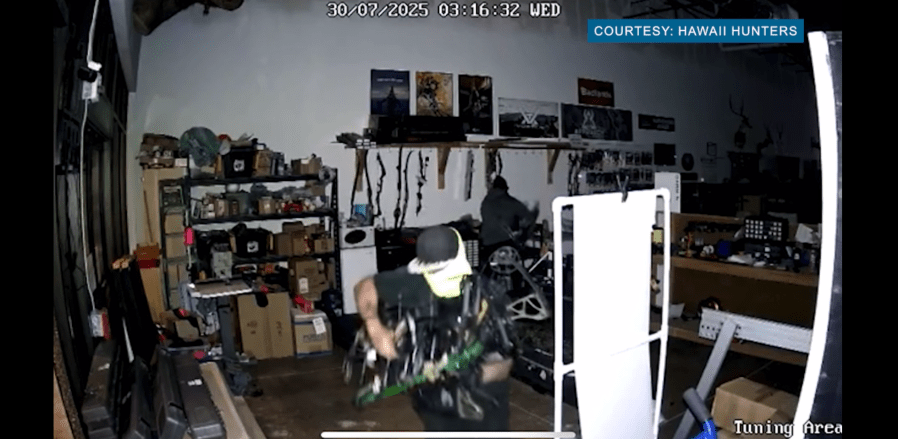HONOLULU (KHON2) — As thousands across Hawaiʻi evacuated coastal areas during July 29’s tsunami warning, criminals took advantage targeting homes and businesses on Maui and Oʻahu.
On Maui, Dana Vincent, owner of Hawaiʻi Hunters at the Maui Mall Village, said he closed up shop around 4 p.m. when the evacuation orders came in.
“Especially because we’re at Maui Mall — we’re 200 yards from Kahului Harbor, where the news said the biggest water fluctuation was happening and — you worry about business, right?” Vincent said.
A few hours after locking up, Vincent said a car pulled up outside his store. Thieves smashed a back window with a sledgehammer and climbed through, grabbing whatever they could.
“They went to the bow rack, grabbed seven bows, threw everything out the window, went back through and grabbed more random items,” he said.
The criminals made off with roughly $10,000 worth of equipment — including spotting scopes, trail cameras, headlamps and bows — all within five minutes.
“Taking advantage of the situation at hand… it’s very upsetting,” Vincent said. “Excuse me if I look angry — it’s just you’re sent home to be safe, and you sit there hoping everyone’s okay, and then there’s people out there doing this.”
He’s urging anyone with information to reach out via social media at Hawaii Hunters and said some fellow business owners told him they stayed behind out of fear they’d be looted too.
“Should I have risked my life to save the business?” Vincent asked. “It’s a tough call. But I feel like family comes first.”
On Oʻahu, one family made a startling discovery when they returned home around 10:50 p.m. that night and found a man inside their home. He was later arrested by police.
While law enforcement agencies statewide were working to evacuate residents and clear roads near the water, officials admit they can’t be everywhere within a disaster area.
“The police can provide visibility, but there’s a point when officers have to leave too — they cannot stay in a disaster area,” said Honolulu Police Department Assistant Chief Aaron Takasaki-Young. “It’s all hands on deck during recovery, and the main goal is getting people to safety.”
For residents hesitant to evacuate because of looting fears, Takasaki-Young recommends taking valuables, locking all doors and windows and investing in a home surveillance system.
He added that thefts during emergency declarations carry heavier legal consequences.
“A normal break-in into someone’s residence during a non-emergency period would be a Class B felony which is punishable up to 10 years, but if you get caught breaking into somebody’s home during this emergency period and if you get caught, charged and punished it is up to 20 years,” he said. “So to go in and loot people when they’re vulnerable, that’s saying something about your character at that time.”
